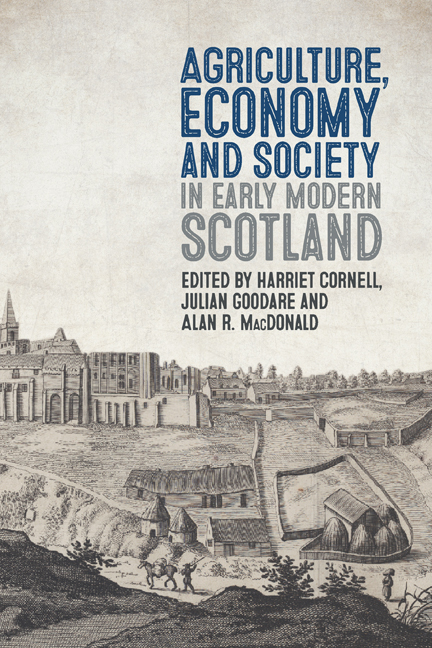Book contents
- Frontmatter
- Dedication
- Contents
- Illustrations
- Contributors
- Acknowledgements
- Note on Currency and Measures
- Abbreviations
- Map of Scotland
- Introduction: Exploring Scotland’s Agricultural History
- 1 Imagining Scottish Agriculture before the Improvers
- 2 The Use of Dykes in Scottish Farming 1500–1700
- 3 The Famine of 1622–23 in Scotland
- 4 Weather and Farming through the Eyes of a Sixteenth-Century Highland Peasant
- 5 Stock, Fermes, Mails and Duties in a Midlothian Barony 1587–89
- 6 The Roots of Improvement: Early Seventeenth-Century Agriculture on the Mains of Dundas, Linlithgowshire
- 7 ‘God Knowis my Sleipis ar Short and Unsound’: Andro Smyth’s Collection of Rent, Tax, Teind and Tolls in Shetland c.1640
- 8 Farming in the Stirling Area 1560–1750
- 9 What Were the Fiars Prices Used For?
- 10 Agriculture and Banking in Eighteenth-Century Scotland 1695–1750
- 11 Capitalism’s Cradle? Ideas, Policies and the Rise of the Scottish Economy in the Mercantilist Age 1600–1800
- Conclusion: A Historiographical and Bibliographical Overview
- Index
- Boydell Studies in Rural History
10 - Agriculture and Banking in Eighteenth-Century Scotland 1695–1750
Published online by Cambridge University Press: 14 May 2024
- Frontmatter
- Dedication
- Contents
- Illustrations
- Contributors
- Acknowledgements
- Note on Currency and Measures
- Abbreviations
- Map of Scotland
- Introduction: Exploring Scotland’s Agricultural History
- 1 Imagining Scottish Agriculture before the Improvers
- 2 The Use of Dykes in Scottish Farming 1500–1700
- 3 The Famine of 1622–23 in Scotland
- 4 Weather and Farming through the Eyes of a Sixteenth-Century Highland Peasant
- 5 Stock, Fermes, Mails and Duties in a Midlothian Barony 1587–89
- 6 The Roots of Improvement: Early Seventeenth-Century Agriculture on the Mains of Dundas, Linlithgowshire
- 7 ‘God Knowis my Sleipis ar Short and Unsound’: Andro Smyth’s Collection of Rent, Tax, Teind and Tolls in Shetland c.1640
- 8 Farming in the Stirling Area 1560–1750
- 9 What Were the Fiars Prices Used For?
- 10 Agriculture and Banking in Eighteenth-Century Scotland 1695–1750
- 11 Capitalism’s Cradle? Ideas, Policies and the Rise of the Scottish Economy in the Mercantilist Age 1600–1800
- Conclusion: A Historiographical and Bibliographical Overview
- Index
- Boydell Studies in Rural History
Summary
Despite the emergence of new economic sectors, or the marked modernisation of others throughout the eighteenth century, Scotland's economy remained overwhelmingly based upon what land and livestock could provide. The Scottish agricultural sector was fundamentally changed during this period, with a whole raft of ‘improvements’ taking place. These boosted the productivity and profitability of the country's soil, but could also cause severe social dislocation within rural communities. Many of these alterations would not have taken place without the establishment of a formal banking system. The chartered banks provided vital capital for landowners operating in an area of the economy, and a country, which at this time suffered from a lack of liquidity.
This chapter considers the intrinsic link between the development of Scottish banking and agricultural reform. It does so by examining some of the records of the Bank of Scotland and the Royal Bank of Scotland during the first half of the eighteenth century, particularly the court minutes for both banking houses. An analysis of these sources sheds some light on the nature of agricultural improvement during a period which has been somewhat under-examined by historians, when compared with the period after 1760 when the speed of improvement increased.
The specific questions considered include the following: What proportion of bank loans went to landowners? Were landowners based in particular regions more likely to receive credit than those from other parts of the country? To what extent was money loaned to landowners used to improve their estates? These considerations are also placed within the context of Scottish economic thought, which often prioritised the modernisation of the rural economy and felt that the emerging banking sector should be geared to serve its development.
* * *
Throughout most of the eighteenth century, Scotland's economy remained overwhelmingly based upon what land and livestock could provide in spite of the emergence of new and profitable sectors, such as the tobacco and sugar trades, as well as the modernisation of linen production and other fledgling industries. One of the most comprehensive studies of the Scottish tobacco trade has asserted that, in spite of its growth, by as late as 1760 at least 80 per cent of the country's output was still generated by agriculture. In this century, Scottish farming certainly did not stand still.
- Type
- Chapter
- Information
- Agriculture, Economy and Society in Early Modern Scotland , pp. 216 - 234Publisher: Boydell & BrewerPrint publication year: 2024



